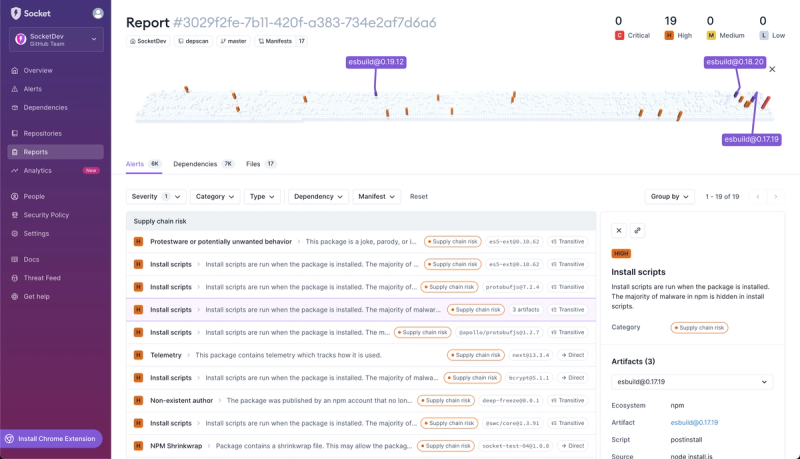
Company News
Connect with Socket at RSA and BSidesSF 2024
Come meet the Socket team at BSidesSF and RSA! We're sponsoring several fun networking events and we would love to see you there.
@frangio/servbot
Advanced tools
Weekly downloads
Readme
A small dev server for local static site development. Essentially a wrapper around http.Server. Fork of servor.
import servbot from 'servbot';
const server = servbot({
root: './public/',
reload: true,
fallback: 'index.html'
});
server.listen(8080);
This is an opinionated fork with some intentional exclusions and smaller scope, and some ideas taken from nativew/serve.
npm install servbot --save-dev
See types in index.d.ts. servbot accepts a single argument, ServbotOptions; and returns an instance of ServbotServer. See below for the default options.
import servbot from 'servbot';
const server = servbot({
// root: string
// Directory to serve. Relative to process.cwd().
root: '.',
// reload: boolean
// Flag to enable manual reload.
reload: false,
// fallback: string
// Filename to fallback to for single-page applications. Relative to `root`.
// Leaving this empty assumes you are not serving a single-page application
fallback: '',
// ignores: RegExp[]
// *Only applicable when `fallback` is provided and `ignores` is not an empty array*
// A list of patterns to *not* route to your fallback
// Useful when you want to be able to route non-filetypes to your SPA ("/foo/routename.hi")
// But otherwise, want to "ignore" routes that should be static files ("/main.css", "/js/jquery.js")
ignores: [],
// credentials: object
// TLS Credentials. Providing these enables an HTTPS server
// See https://nodejs.org/api/https.html#httpscreateserveroptions-requestlistener
credentials: undefined
});
// Start server on port 8080
server.listen(8080);
// Close server from new connections
// https://nodejs.org/api/net.html#serverclosecallback
server.close((err) => {
if (err) process.exit();
});
Instead of including a filewatcher to automatically reload your app on file changes, servbot includes a manual reload feature. Most modern front-end development build tools already include a built-in watch feature (esbuild, rollup, webpack, parcel, etc.) that can be leveraged by servbot. For an example with rollup, see here.
Outside of build tools, you can also use something like cheap-watch or watchlist. See below for an example using watchlist:
import servbot from 'servbot';
import { watch } from 'watchlist';
const server = servbot({
root: './example/static/',
reload: true,
fallback: 'index.html'
});
server.listen(8080);
(async () => {
await watch(['./example/static/'], async () => {
console.log('change detected! reloading...');
server.reload();
});
})();
FAQs
A small dev server script for local static site development
The npm package @frangio/servbot receives a total of 518 weekly downloads. As such, @frangio/servbot popularity was classified as not popular.
We found that @frangio/servbot demonstrated a not healthy version release cadence and project activity because the last version was released a year ago. It has 1 open source maintainer collaborating on the project.
Did you know?

Socket for GitHub automatically highlights issues in each pull request and monitors the health of all your open source dependencies. Discover the contents of your packages and block harmful activity before you install or update your dependencies.

Company News
Come meet the Socket team at BSidesSF and RSA! We're sponsoring several fun networking events and we would love to see you there.

Security News
OSI is starting a conversation aimed at removing the excuse of the SaaS loophole for companies navigating licensing and the complexities of doing business with open source.

Product
We're introducing dependency visualization for reports - get a quick impression of the state of your dependencies without getting lost in the details.